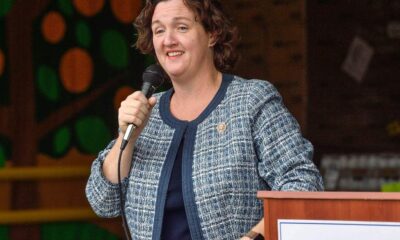Federal appeals court rules against Huntington Beach’s effort to bypass housing requirements.
A federal appeals court delivered a blow to Huntington Beach’s legal bid to sidestep state housing mandates, affirming the dismissal of the city’s lawsuit against California’s housing law requirements. The U.S. 9th Circuit Court of Appeals’ decision, handed down Wednesday, upholds a previous court ruling rejecting the city’s challenge, adding another setback to its long-running housing policy dispute with the state.
The March 2023 lawsuit was Huntington Beach’s response after the state filed a separate legal action in state court, demanding the city comply with California’s zoning laws to facilitate new housing construction. A district court dismissed Huntington Beach’s federal case last year, ruling that the city lacked the standing to assert constitutional claims against the state’s housing mandates. This week’s appellate ruling unanimously reaffirmed that decision, stating the case had no grounds for federal review.
California Governor Gavin Newsom and Attorney General Rob Bonta, who have frequently condemned Huntington Beach’s opposition to state housing mandates, welcomed the appellate court’s ruling.
“Today, yet another court has slapped down Huntington Beach’s cynical attempt to prevent the state from enforcing our housing laws,” Newsom said in a statement. “Huntington Beach officials’ continued efforts to advance plainly unlawful NIMBY policies are failing their own citizens — by wasting time and taxpayer dollars that could be used to create much-needed housing. No more excuses — every city must follow state law and do its part to build more housing.”
Echoing this sentiment, Bonta remarked, “While the city has been wasting the public’s time and money pursuing this meritless lawsuit, its neighboring communities — along with every Californian struggling to keep a roof over their heads or wondering where they’re going to sleep tonight — need Huntington Beach to step up and adopt a housing plan without further delay.”
To date, Huntington Beach’s City Council has refused to implement zoning changes that would permit the construction of over 13,000 new homes in the coastal city, arguing its charter city status exempts it from state-mandated housing laws. The appellate court, however, dismissed this argument, stating that California cities, whether chartered or not, remain subject to state law as subordinate political bodies.
Additionally, the judges rejected Huntington Beach’s attempt to invoke free speech rights on behalf of Mayor Gracey Van Der Mark and Councilmember Tony Strickland, who had argued that their rights protected them from being required to sign housing mandate documents.
Despite the unfavorable ruling, Huntington Beach City Attorney Michael Gates expressed the city’s determination to continue its legal battle. Gates said the city intends to seek a hearing with a larger panel of judges and, if necessary, will petition the U.S. Supreme Court to take up the case.
“We have to keep fighting,” Gates said. “At some point, the tide is going to turn … and we are going to start to get more favorable rulings.”
Gates characterized the state’s authority over city council housing votes as “fundamentally un-American and unconstitutional.”


 Environment3 years ago
Environment3 years ago
 Community3 years ago
Community3 years ago
 Uncategorized2 years ago
Uncategorized2 years ago
 Uncategorized12 months ago
Uncategorized12 months ago
 Community3 years ago
Community3 years ago
 Uncategorized3 years ago
Uncategorized3 years ago
 Community3 years ago
Community3 years ago
 Community3 years ago
Community3 years ago






